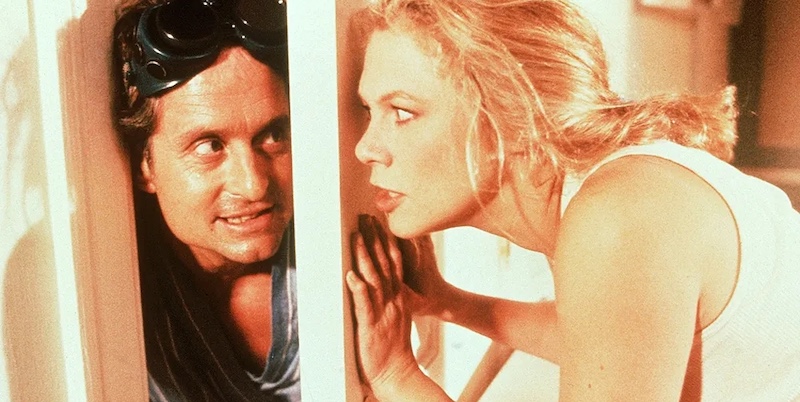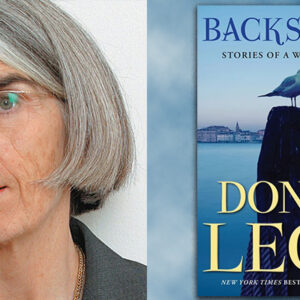It can be difficult for those of a certain age to accept that generations will not automatically think of Danny DeVito as irascible reprobate Louie De Palma on Taxi (1978-1982) but as irascible reprobate Frank Reynolds on It’s Always Sunny in Philadelphia (2005-the foreseeable future). DeVito is long deserving of recognition as the stealth MVP of 1990s crime cinema, as both producer—his Jersey Films banner made Pulp Fiction (1994) along with the Elmore Leonard adaptations Get Shorty (1995) and Out of Sight (1998)—and actor, turning up as a pampered movie star in Shorty and a scandal-rag kingpin in James Ellroy’s L.A. Confidential (1997).
Not to be overlooked is his output as director, a half-dozen films each boasting a considerable criminal element. This month, DeVito will receive the highest tribute that contemporary Hollywood has to offer: a remake of one of his movies. Although the upcoming The Roses is being touted as a “reimagining” of his pitiless 1989 marital comedy The War of the Roses. In a 2002 interview with the Orange County Register, DeVito tried to explain the origins of his cinematic sensibility: “I don’t know if it was my sister taking me to Fritz Lang movies, or crawling up in front of a TV watching Orson Welles in The Third Man, or loving movies like Sunset Boulevard and Double Indemnity. But I also love the Three Stooges, the Marx Brothers, and W. C. Fields.” That combination of madcap and mayhem would prove the signature of a Danny DeVito film.
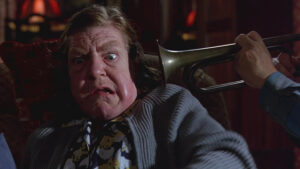
“Just meet her. Maybe she’d be somebody you’d like to kill.”
Throw Momma from the Train (1987)
His big-screen directorial debut may have been sold as a dark comedy, but for writers, Throw Momma from the Train is a straight-up horror movie. Larry Donner (Billy Crystal) must contend with a trifecta of literary nightmares. His work has been stolen, his ex-wife publishing his novel under her name to huge success. Consequently, he’s blocked, unable to decide if the night in his next opus is humid or moist. (Worse, he’s violating Elmore Leonard’s first rule of writing: “Never open a book with weather.”) And the students in his creative writing class are sapping his will to live. One of them, the timid Owen Lift (DeVito), stalks Larry, repeatedly ambushing him to ask why his stories don’t measure up. In a moment of pity, Larry suggests that Owen take cues from Alfred Hitchcock. One screening of Strangers on a Train (1951) later, Owen has murdered Larry’s ex and now expects his teacher to return the favor by bumping off his domineering mother (Anne Ramsey, who received an Oscar nomination for her performance).
DeVito’s film is alive to the farcical implications built into the premise of the 1950 Patricia Highsmith novel that spawned Hitchcock’s adaptation. His kinetic style owes less to the Master of Suspense than to Hitch’s greatest acolyte, Brian De Palma, who directed DeVito in the previous year’s mafia comedy Wise Guys; DeVito even angled for a De Palma cameo in the scene where Owen watches Strangers but was thwarted by scheduling. Abetted by cinematographer Barry Sonnenfeld, who would go on to direct Get Shorty, DeVito shows a flair for flamboyant transitions: an airplane flying over the print on a Hawaiian shirt; a practical effect merging Larry’s classroom into his shabby apartment. The Three Stooges influence is evident, too. The Cousin Paddy scene, as broad as can be, still elicits huge laughs.
But the comedy never comes at the expense of character. Owen’s fantasies of murdering his mother are vivid, as is the guilt he feels in their aftermath. The scene when Owen shows Larry his coin collection, added by screenwriter Stu Silver at DeVito’s urging, is heartbreaking. The performance remains one of DeVito’s finest moments as an actor. He knew it, telling the Daily News in December 1987 that playing the sensitive manchild was “a bold step for me. And that’s what I wanted to do instead of playing another role of a man with a heart of brass. I’m patting myself on the back. Good going, Danny D!” With a success as actor/director under his belt, he was ready to move on to something bigger—and even darker than a comedy about murder.
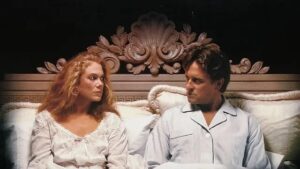
“A civilized divorce is a contradiction in terms.”
The War of the Roses (1989)
DeVito’s sophomore effort was a Taxi reunion of sorts. Produced by series co-creator James L. Brooks, with Warren Adler’s 1981 novel adapted by Emmy Award winner Michael Leeson, The War of the Roses is among the most savage of studio comedies, tapping into the well of rage that can be engendered by divorce.
Attorney Gavin D’Amato (DeVito) offers a cautionary tale to a prospective client (Dan Castellaneta, the voice of Homer Simpson, who never utters a word), saying that “When a man who makes four hundred and fifty dollars an hour wants to tell you something for free, you should listen.” He relays the story of his friends Oliver and Barbara Rose (Michael Douglas and Kathleen Turner), their whirlwind romance, happy marriage, and calamitous estrangement.
Spanning eighteen years of the Rose union (necessitating the use of some unfortunate wigs on Douglas), the film deftly details how love can curdle. Oliver becomes a high-powered Washington DC lawyer while Barbara concentrates on being a wife and mother. Douglas, then in his glory years portraying flawed American men, is oblivious to how he simultaneously encourages and undermines his spouse. The two begin bearing their fangs more frequently, each taking out their grievances on the other’s pet. (Word of warning: animals don’t fare well in the proceedings.) When Barbara demands a divorce, Oliver says, “You owe me a reason that makes sense.” She then reels off a litany of the annoying behaviors that lead her to say, “I just want to smash your face in.” All she requests in the settlement is the house that she found for their family. Oliver’s wounded vanity—and his misguided insistence that deep down, they’re meant to be together—won’t allow him to give it up. Heeding Gavin’s advice to exploit a law meant to aid poor people in dissolving their marriages, Oliver moves back into their home, which will soon resemble the besieged farmhouse in Night of the Living Dead (1968).
DeVito’s extravagant instincts are tempered here, possibly due to the guiding hand of Brooks. Sure, Gavin’s lascivious midmeal interlude with his date’s foot isn’t shot in the manner of Hitchcock so much as Hitch lampooned by Mel Brooks in High Anxiety (1977). But there are also the dueling POVs of the Roses during a quiet dinner that illustrate how differently the marriage is viewed by each party. The more restrained approach permits the movie to walk the finest of lines. The violence is sometimes slapstick but always intimate. As cruel and borderline uncomfortable as the action gets, DeVito never loses control, grounding events in a sense of lost trust and ending with a potent metaphor: Oliver and Barbara suspended in a chandelier above the ruins of the home they made together.
The War of the Roses works because its leads share a screen history that carries some of the weight of a real-life marriage. Douglas and Turner had costarred in Romancing the Stone (1984) and its sequel The Jewel of the Nile (1985), films in which DeVito served as comic foil. His relationship with Douglas goes back even further; the two were roommates in 1960s New York. Casting Douglas and Turner is the late 1980s equivalent of using Tracy and Hepburn or Burton and Taylor. The upcoming reboot, with Olivia Colman and Benedict Cumberbatch, won’t be able to trade on similar magic.
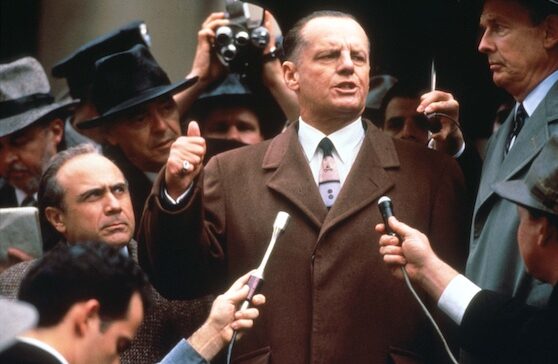
“There’s a time to shirk and a time to work.”
Hoffa (1992)
Now trusted with a sizeable budget, DeVito opted for a truly big swing. His third film was a sprawling epic that tackled one of the twentieth century’s great true-crime stories: the disappearance and presumed execution of former union boss Jimmy Hoffa. Playwright David Mamet was paid one million dollars to revise a script written in consultation with Hoffa’s attorney Frank Ragnaro. Playing the labor kingpin would be DeVito’s friend, former costar, and fellow Jersey boy Jack Nicholson.
The lavishness of the enterprise gave DeVito free rein to lean into artifice. Key scenes are filmed on soundstages in a style explicitly evoking the 1940s noirs that DeVito so admires. Every transition has been meticulously planned—the shadow of a truck driver matched to the silhouette of the same character walking down a street years later, a snowy prison yard dissolving to the pristine white of a golf ball—to the extent that Hoffa can feel like a series of segues in search of a story. The grandiosity of DeVito’s technique is unfortunately at odds with Mamet’s telegraphic script. The writer’s dialogue verges on self-parody, as when Hoffa challenges mafia don Armand Assante by asking, “We talking words here? … We using words? That what we’re doing?” Mamet is uninterested in explaining the crimes Hoffa was charged with by the federal government much less exploring whether the Teamsters chief was guilty of them. The script ping-pongs through time without the anchor of a chronology, the occasional visual signifier such as a billboard promoting A Clockwork Orange (1971) like a thumb in the eye. Hoffa is the only fully drawn character, the others including Assante’s gangster and DeVito’s right-hand man composite figures feeling composite emotions. Ultimately the film is a one-sided romance, and the International Brotherhood of Teamsters is never going to love Jimmy Hoffa back.
The film generated controversy owing to its heroic portrayal of the title character. DeVito told Patrick Goldstein of the Los Angeles Times in August 1992 that “if we had a guy like this running the country, I’d breathe easy,” dismissing claims that Hoffa’s dealings with organized crime diminished his effectiveness as a labor leader. The biopic opened to soft box office and an indifferent critical reception. Nowadays it has been superseded by Martin Scorsese’s The Irishman (2019), with Al Pacino as Hoffa. But the film has its merits, chief among them DeVito’s enthusiastic embrace of scale and Nicholson’s pugnacious turn, which ranks among the actor’s personal favorites.
DeVito next pivoted to a children’s film, a decision that in retrospect makes perfect sense. The exaggerations and cockeyed angles that he loves are ideally suited to younger viewers and to a story of kids trying to fathom the world of grown-ups. Matilda (1996), based on a novel by Roald Dahl, is also unquestionably a crime movie. The bookish heroine played by Mara Wilson discovers that her gauche used-car-dealer father (who else but DeVito?) is being watched by the FBI—only DeVito would cast Paul Reubens as a federal agent—and exposes a decades-old murder committed by the vindictive headmistress of her school (Pam Ferris). DeVito narrates the warmhearted film in a grandfatherly voice that makes it possible to forget the same actor is onscreen as the despicable Harry Wormwood.
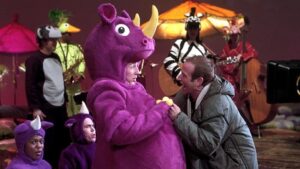
“They’re the roughest of all the charities.”
Death to Smoochy (2002)
What if the most wholesome environment imaginable—children’s television, then the realm of Barney the Dinosaur—was revealed to be a cesspool brimming with graft and temptation? Screenwriter Adam Resnick, a veteran of Late Night with David Letterman, takes the concept to an extreme in Death to Smoochy, building the story around an incorruptible figure that he likened to NYPD whistleblower Frank Serpico. Critics and audiences didn’t take to Smoochy in 2002, but a growing cult has embraced it as the funniest film Danny DeVito directed, profanely hilarious and hilariously profane.
The brightest star in the KidNet galaxy is Rainbow Randolph (Robin Williams). Naturally, “the friendliest friend on earth” is a drug-addled egomaniac given to fits of rage. When he’s busted in an FBI sting, the network decrees that his replacement must be “a bottle of pancake syrup with legs.” Enter Smoochy the Rhino, aka Sheldon Mopes (Edward Norton). The squeaky-clean Sheldon is ready to go to work, armed with hundreds of original songs on subjects ranging from “the deliciousness of vegetables to the importance of donating plasma.” As Smoochy’s Magic Jungle becomes a ratings behemoth, Sheldon not only has to battle against betraying his ethics. There are nonprofits that operate like crime families, Irish gangsters looking to wet their beaks, and Randolph plotting Smoochy’s demise so he can return to the top of the kids’ TV mountain.
DeVito, who has a role as Sheldon’s venal agent, gores sacred cows with gusto. He balances a range of comic tones, finding room amidst the vulgarity for Sheldon’s performance of the strangely heartfelt song “But My Stepdad’s Not Mean, He’s Just Adjusting.” It’s impossible to watch Norton’s Oscar-nominated turn as Pete Seeger in A Complete Unknown (2024) and not think it’s part of the Smoochy Extended Cinematic Universe. 2002 was Williams’ year of villainy; he held his own opposite Al Pacino in the Christopher Nolan-directed remake of the Scandinavian noir Insomnia and delivered a career best in One Hour Photo. Smoochy gave him the chance to play a comic heavy, one deep in the throes of an identity crisis. When asked if he’s OK, Randolph replies, “I don’t know. I’m kind of fucked up in general, so it’s hard to gauge.” Smoochy’s secret weapon is Catherine Keener’s spectacularly hostile performance as the executive in charge of Sheldon’s show, who has shielded her belief in children’s television in an impenetrable armor of cynicism.
Death to Smoochy disappointed at the box office. Perhaps there’s never a right time for a film featuring pornographic cookies, Jon Stewart in an unflattering Caesar haircut, and an assassination staged at a Wagnerian-themed children’s ice show. DeVito opened his DVD commentary track by acknowledging that “the mourning period” for Smoochy was now over. But in the intervening decades, he has defended the movie. As well he should.
Duplex (2003) plays like a mash-up of DeVito’s first two hits—a desperate scheme to murder an elderly woman leads to the destruction of a beloved home—but without the sharpness and clever construction. Ben Stiller and Drew Barrymore play a young couple who, like so many others, migrate to Brooklyn as if it’s the promised land, buying the title property and inheriting an unexpectedly tenacious tenant (Eileen Essell, appearing in only her second film at age 79). It’s the sole film DeVito directed in which he doesn’t act, although he does provide the narration. Duplex feels slapdash, its humor veering toward the crude. Stiller, who made his directorial debut with the DeVito-produced Reality Bites (1994), provides multiple moments of cringe comedy that again may be too close to the bone for writers, like his character’s reaction when asked to sign a copy of his novel salvaged from a used book store’s bargain table. It would be the last DeVito-directed film to appear in theaters. He stepped behind the camera once more for St. Sebastian, which he described as an “edge-of-your-seater” and “my first foray into the thriller genre,” but the film, which completed post-production in 2012, has never been released.
Danny DeVito is destined to be remembered as a gifted actor first and a game-changing producer second. But his efforts as director warrant consideration. Talking up Death to Smoochy in 2001, he called it “a comedy with an edge, full of lots of dark stuff, like all my work.” That’s the most difficult of genres, and three worthy examples of the form is a batting average to be proud of.

